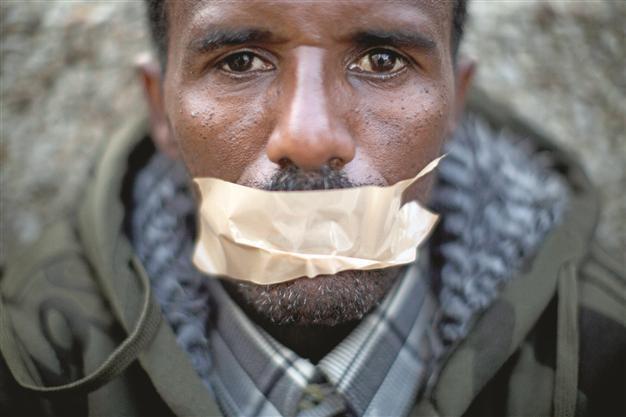Human trafficking is modern slavery

An African migrant covers his mouth with tape during a protest. AP photo
Human trafficking is the modern name for slave trade; it is a century old social practice, accepted during some historical times through written laws or customs. If states’ modernization and democratization led to slavery abolition starting with 13th to 19th centuries, the situation of sexual exploitation of women and children or forced labor imposed to some people recruited through fraudulent lies meant to be sold in order to obtain profit is different.These practices, kept on in a latent, suddenly exploded in the late twentieth and early twenty-first century in Europe as a billion dollar business, second as profitability after drug trafficking. The more profitable as, unlike drug trafficking, the „product” could be sold again. At the same time, a big number of human traffic victims recorded in the official statistics plus those who either do not consider themselves as victims, or do not want to admit it during enquiries, question the way the European Union respects human dignity – fundamental right assumed by Western civilization.
Analyzing the sudden changes caused by the industrial revolution of the late 19th century, Emile Durkheim noticed that these have caused a rupture of the traditional community ties between the individual and the guild he belonged to until then, a fragmentation of the social identity, an inability of some people to be adapt to the new demands of the labor market, a rejection of new social practices.

Former President of Romania
From a sociological and psychological point of view, not much different was the case of the post-communist societies in transition, in Eastern Europe, at the end of twentieth century. The collapse of communist dictatorships in this region brought the people living in this space freedom, guarantees of fundamental human rights, the opportunity to live in democracy and improve their life in the new conditions of a free market economy. Job loss and the difficulty of integrating young people on the new labour market have increased the desire to emigrate in an idealized West, seen as the only solution for a decent life or, at least, for survival. Very soon a new kind of modern slavery proliferated and trafficking networks have been internationalized and found accomplices from the police forces and other corrupt officials who became rich on the defenseless victim. If we look at the phenomenon from the perspective of a market economy, we can see that proliferation of human trafficking networks is not only the consequence of an increasing offer from the post-communist states (or countries outside Europe). It is equally the consequence of an increasing demand in the receiving countries, where traffickers operate national networks or branches of international networks recruiting vulnerable people in the East to get rich, by subjecting them to forced or illegal labor, prostitution and begging.
We must say it very clear: there are traffickers as they are allowed to exist. Loopholes, the complicity of civil servants, magistrates’ tolerance are not likely to reduce human trafficking. At the same time, the economic downturn and financial crisis in the countries of origin contribute to increasing the supply, to assuming risks to escape into the unknown of more and more vulnerable persons due to poverty, lack of education and information. But the huge economic growth of human trafficking, persons used for illegal labor, prostitution and sexual exploitation of minors of both sexes, comes also from the increasing demand on the European Union markets.
Perhaps even because of the arrogance of teaching lessons to others the European Council decided only in April 2004 to adhere to the UN Convention from November 15, 2000 against transnational organized crime. And only in July 2006, the European Council approved, on behalf of the European Community, the Protocol on prevention, suppress and punish human trafficking, especially women and children, as additional protocol to the UN Convention.
It was just a first step, as along with preventive measures - as responsibility of European Union member states and their obligations to protect victims, the most important thing is, in my opinion, to regulate the cooperation between member states authorities for strengthening the borders control and for increasing the efficiency in the exchange of information regarding members of human trafficking networks and other organized crime groups; and there is still more to be done about it.
A sustainable solution is not possible without an exemplary mobilization of civil society, schools and parents, in order to identify vulnerable people, especially underage, and to help them not making hasty decisions that could result in a fall under the influence of individuals expert in recruiting for the benefit of traffickers networks and pimps. Eradication of illicit human trafficking of people across all Europe is a matter of us all.
This is the speech by Emil Constantinescu at the 17th Eurasian Economic Summit in Istanbul.
















